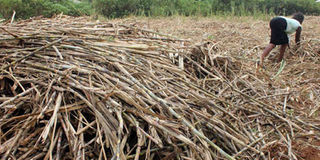Breaking News: Old Kijabe dam tragedy: Death toll rises to 45
The challenge of privatising sugar firms

A farmer sorts out dry sugarcane at a farm in Yiro Village, Siaya County. PHOTO | FILE | NATION MEDIA GROUP
What you need to know:
- There is no clear evidence that the private millers produce better sugar that can compete in the external market.
- The successful privatisation of state-owned millers will only be achieved through a media campaign.
When I walked into a friend’s office in 2015, carrying a newspaper write-up detailing the Privatisation Commission’s schedule of activities, he looked at me and remarked: “Not in our time, the process will soon hit a snag.”
His sentiments came to pass, as the schedule was suspended.
A High Court ruling last year effectively allowing the commission to progress with the sale of the millers injected a lease of life into the plan to put the firms in the hands of strategic investors.
But is the commission prepared to deviate from the path that has characterised the proposed sale of the state-owned millers for the past 15 years?
PRIVATISATION
While the report that the commission is targeting August as the deadline for the sale is a positive step, it remains to be seen if the plan will come to fruition.
The rejection by governors from the western Kenya sugar belt of the plan to sell five millers, urging that the process be started afresh, is an indication of the rough terrain the commission is beginning to ride once again.
Having keenly followed the progress, I doubt that anything meaningful will come out of this.
It has been said that handing the millers to the county governments will diminish the privatisation bid.
However, how the commission handles the interest of governors from the Lake Region Economic Bloc (LREB) holds the master key to progress.
INVESTORS
This cannot be left to the technocrats at the commission.
Governors in the western Kenya sugar belt must be involved as they will have the last word.
Proponents of the sale, including the government, hold the view that the running of these firms can no longer be sustained.
They must be given to an investor who will make money and stop relying on the government.
There is also the issue of who owns the land on which the firms are situated?
Does it mean that the local community will continue to graze and collect firewood from the nucleus estates after the sale?
LAND OWNERSHIP
Several years ago, when opposition leader Raila Odinga successfully bid for a molasses plant in Kisumu, he was first told the land belonged to someone else.
It was until the government finally gave him a leasehold, many years later, that he took ownership.
The private millers the commission cites as the best examples that sustain farmers and produce sugar that is competitive in the region show that it has not understood the finer details in sugar production.
The state-owned millers argue that it is dishonest to draw parallels between them and private firms because they operate in completely different legal frameworks, yet to be able to do business, you must operate in a level playing ground with competitors.
PROFIT
There is also the notion that private millers largely have no cane of their own and most times have to rely on agents that deliver cane to their factories by all means possible, including luring farmers with little goodies and false promises.
Private millers operate with a slim workforce to achieve profits that seem to be the only thing the commission is looking at in reaching the conclusion.
There is also no clear evidence that the private millers produce better sugar that can compete in the external market.
CONSULTATION
The sugar quality is dependent on environmental factors the cane is exposed to before harvesting as well as the duration it takes to crush it after harvesting.
The successful privatisation of state-owned millers will only be achieved through a media campaign, involving vernacular stations, the notion that it is going to impoverish locals.
If the commission does not change tack, crossing the Rubicon will remain a pipe dream.
Mr Awino, a sugar expert in western Kenya, is a member of Public Relations Society of Kenya. [email protected]




